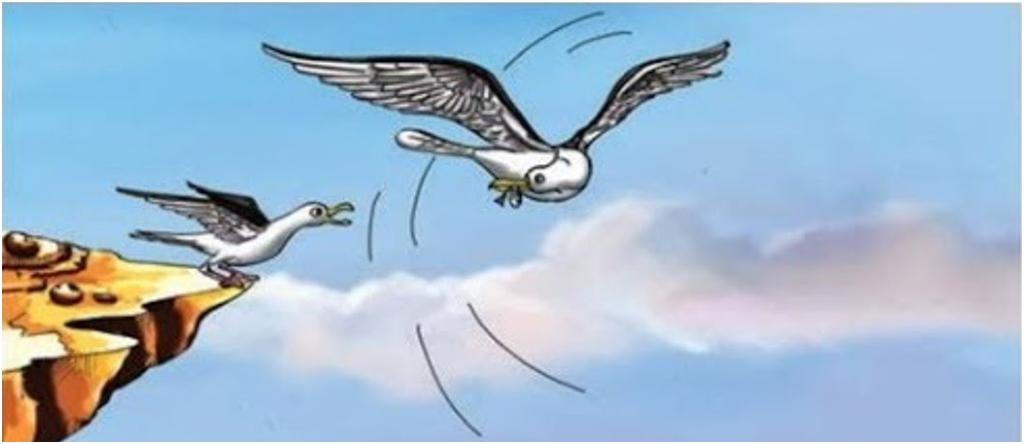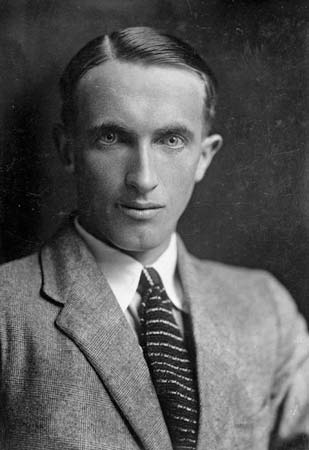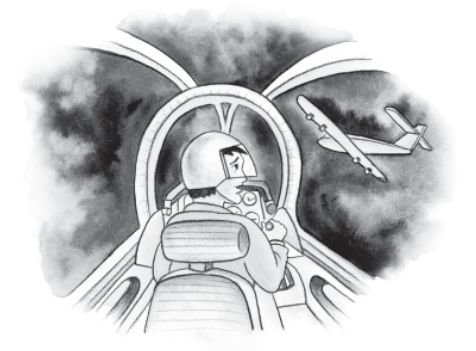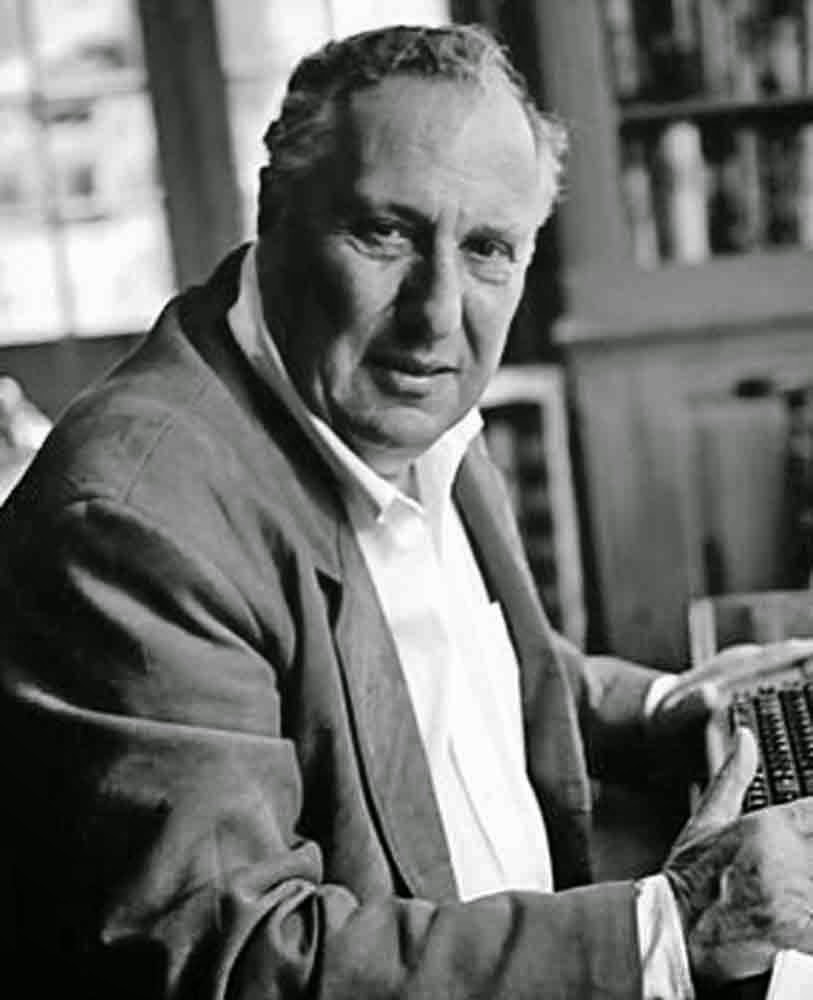- Books Name
- First Flight and Foot prints
- Publication
- ACERISE INDIA
- Course
- CBSE Class 10
- Subject
- English
Lesson-3
Two Stories About Flying
(1) His First Flight
By Liam O’ Flaherty
“The journey of a thousand miles begin with a single step”

His First Flight Introduction
"Liam O' Flaherty's" storey is about a young bird who is afraid to fly for the first time. He believes that his wings will not be able to support him. Despite his younger siblings flying fearlessly with much shorter wings, he couldn't muster the courage. He was punished by being forced to go hungry if he did not try. Thus, it was his mother who forced him to fly by enticing him with food. The lesson demonstrates how one hesitates to take the first step and how fear is all in one's mind. Because "the fear of suffering is worse than the suffering itself," one should have faith in one's abilities.
His First Flight Summary
"Liam O' Flaherty's" storey "His First Flight" is about a young seagull who is afraid to fly. Despite their much shorter wings, his younger siblings flew fearlessly, whereas he couldn't muster the courage to trust his own wings. When he saw his parents perfecting the art of flying for his younger siblings, the young seagull became sad. His parents chastise and mock him for not even attempting. They even refer to him as a "coward." They beg him to try and threaten him with leaving him alone and hungry if he does not. The next day, he is left alone, and when he becomes hungry, he tries to attract the attention of his family members. His son is only noticed by his mother, who is withering a fish in an attempt to eat it. The young seagull cries out in desperation, hoping that his mother will come to his aid. He becomes ecstatic when he sees his mother approaching him with the fish. But when he notices his mother has stopped mid-way, he becomes enraged out of hunger and dives at the fish, forgetting for a moment that he is afraid to fly. He finally took his first flight. Everyone in his family celebrates his victory by cheering and dancing around him. He also tries to float in the sea, which he was once afraid of. As a result, he overcomes his fear and realises that it is all in his head.
His First Flight Lesson Explanation
THE young seagull was alone on his ledge. His two brothers and his sister had already flown away the day before. He had been afraid to fly with them. Somehow when he had taken a little run forward to the brink of the ledge and attempted to flap his wings he became afraid. The great expanse of sea stretched down beneath, and it was such a long way down — miles down. He felt certain that his wings would never support him; so he bent his head and ran away back to the little hole under the ledge where he slept at night.
- Seagull- a bird that lives near the sea and has short legs, long wings, and white and grey feathers
- Ledge- a narrow horizontal shelf projecting from a wall (or here) a cliff
- Brink- the extreme edge of land before a steep slope or a body or water
- Expanse- a wide continuous area of something
The plot revolves around a young seagull who is in the process of learning to fly. He, unlike his younger brothers and sisters, is terrified of flying. Except for him, when they attempted to fly for the first time near the edge of the sea, they all succeeded. He couldn't put his faith in his wings. He became terrified of the vast sea and convinced himself that he would never be able to fly. As a result, he was embarrassed and disheartened, and he retreated to the ledge where he usually slept.
Even when each of his brothers and his little sister, whose wings were far shorter than his own, ran to the brink, flapped their wings, and flew away, he failed to muster up courage to take that plunge which appeared to him so desperate. His father and mother had come around calling to him shrilly, upbraiding him, threatening to let him starve on his ledge unless he flew away. But for the life of him he could not move.
- Flapped- (of a bird) move (its wings) up and down when flying or preparing to fly
- Muster- gather
- Plunge- jump or dive
- Shrilly- with a high pitched and piercing voice or sound
- Upbraiding- scold
Despite the fact that his younger siblings' wings were shorter than his, he could not muster the courage, no matter how hard he tried. His parents chastised him for not trying again, but he was too terrified to move.
That was twenty-four hours ago. Since then nobody had come near him. The day before, all day long, he had watched his parents flying about with his brothers and sister, perfecting them in the art of flight, teaching them how to skim the waves and how to dive for fish. He had, in fact, seen his older brother catch his first herring and devour it, standing on a rock, while his parents circled around raising a proud cackle. And all the morning the whole family had walked about on the big plateau midway down the opposite cliff taunting him with his cowardice.
- Herring- a soft-finned sea fish
- Devour- eat quickly
- Cackle- laugh in a loud, harsh way
- Cowardice- lack of bravery
He had been alone for a day after attempting because his parents were preoccupied with his siblings. They assisted his siblings in learning to fly and dive for food (fish). His older brother even caught his first fish, which he proudly ate while his parents celebrated. His parents mocked him all the way to school that morning for being a coward.
The sun was now ascending the sky, blazing on his ledge that faced the south. He felt the heat because he had not eaten since the previous nightfall. He stepped slowly out to the brink of the ledge, and standing on one leg with the other leg hidden under his wing, he closed one eye, then the other, and pretended to be falling asleep. Still they took no notice of him. He saw his two brothers and his sister lying on the plateau dozing with their heads sunk into their necks. His father was preening the feathers on his white back. Only his mother was looking at him. She was standing on a little high hump on the plateau, her white breast thrust forward. Now and again, she tore at a piece of fish that lay at her feet and then scrapped each side of her beak on the rock. The sight of the food maddened him. How he loved to tear food that way, scrapping his beak now and again to whet it.
- Ascending the sky- the act of rising up through the air
- Preening-to tidy and clean its feathers
- Hump- a rounded raised mass of earth or land
- Scrapped- discard
The sun had now risen, and he was feeling the heat more than ever because he had been fasting since the previous night. To attract his family's attention, he stepped off his ledge and pretended to sleep on one leg. Nonetheless, no one noticed him. His siblings were sleeping, his father was cleaning his feathers with his beak, and his mother was eating fish on another plateau when he walked by. Because he was starving, the seagull became enraged when he saw the fish. He liked to tear fish apart and scrape his beak every now and then.
“Ga, ga, ga,” he cried begging her to bring him some food. “Gaw-col-ah,” she screamed back derisively. But he kept calling plaintively, and after a minute or so he uttered a joyful scream. His mother had picked up a piece of the fish and was flying across to him with it. He leaned out eagerly, tapping the rock with his feet, trying to get nearer to her as she flew across. But when she was just opposite to him, she halted, her wings motionless, the piece of fish in her beak almost within reach of his beak. He waited a moment in surprise, wondering why she did not come nearer, and then, maddened by hunger, he dived at the fish.
- Derisively- in a manner expressing contempt or ridicule.
- Plaintively- sad
- Uttered- make a sound with one’s voice
- Halted- stopped
He screamed in hunger to his mother, who screamed back angrily, but he kept crying, which soon turned into a joyful scream when he saw his mother flying towards him with the piece of fish. As she got closer, he became excited and leaned forward. She came to a sudden halt not far from him. He dived at the fish out of excitement and hunger, not realising for a moment that he was afraid to fly.
With a loud scream he fell outwards and downwards into space. Then a monstrous terror seized him and his heart stood still. He could hear nothing. But it only lasted a minute. The next moment he felt his wings spread outwards. The wind rushed against his breast feathers, then under his stomach, and against his wings. He could feel the tips of his wings cutting through the air. He was not falling headlong now. He was soaring gradually downwards and outwards. He was no longer afraid. He just felt a bit dizzy. Then he flapped his wings once and he soared upwards. “Ga, ga, ga, Ga, ga, ga, Gaw-col-ah,” his mother swooped past him, her wings making a loud noise. He answered her with another scream. Then his father flew over him screaming. He saw his two brothers and his sister flying around him curveting and banking and soaring and diving.
- Monstrous- horrible
- Seized- grab
- Headlong- with the head foremost
- Soaring- flying or rising high in the air
- Swooped- (especially of a bird) move rapidly downwards through the air
- Curvetting- perform a series of jumps on the hind legs
He became so enthralled that he fell the first time he tried. For a brief moment, he was stunned and stood motionless in terror. All of this happened in an instant, and soon his feathers opened as he flew. The wind was brushing against his breast feathers, stomach, and wings. He could feel himself piercing the air. He was no longer afraid. He was a little nervous at first, but his mother came with him. The entire family screamed with delight, celebrating his triumph over fear.
Then he completely forgot that he had not always been able to fly, and commended himself to dive and soar and curve, shrieking shrilly. He was near the sea now, flying straight over it, facing straight out over the ocean. He saw a vast green sea beneath him, with little ridges moving over it and he turned his beak sideways and cawed amusedly.
- Shrieking- making a high-pitched piercing cry or sound
- Shrilly- loudly and forcefully
- Ridges- a long, narrow hilltop, mountain range, or watershed
- Cawed- utter a caw
He forgot he was afraid of it once he had overcome it. He did everything he had previously feared. He was flying straight over the sea, and he could see the greenery and mountains below him. He screamed with delight as he celebrated his victory.
His parents and his brothers and sister had landed on this green flooring ahead of him. They were beckoning to him, calling shrilly. He dropped his legs to stand on the green sea. His legs sank into it. He screamed with fright and attempted to rise again flapping his wings. But he was tired and weak with hunger and he could not rise, exhausted by the strange exercise. His feet sank into the green sea, and then his belly touched it and he sank no farther. He was floating on it, and around him his family was screaming, praising him and their beaks were offering him scraps of dog-fish. He had made his first flight.
- Beckoning- gesture
When he landed, his family landed alongside him as a proud gesture. In their high pitched voices, they screamed and shouted in delight. He then went into the sea, where he became terrified and panicked. He attempted to flee but became exhausted and weak from hunger. As a result, when he calmed down, he began floating in the sea he had once feared. His family was overjoyed and offered him food as a form of praise. He had finally overcome his fear and taken his first flight.
About the Author

Liam 0′ Flaherty was a novelist and short storey writer from Ireland. He was born on August 28, 1896, and died on September 7, 1984. He was born in the remote Galway village of Gort Nag Capall. He enrolled at Rockwell College in 1908. With his best-selling novel 'The Informer,' he rose to literary prominence (1925). Return of the Brute, his next novel, was also a huge success. 0' Flaherty will be remembered as a key figure in Ireland's literary renaissance.
(2) Black Aeroplane
By Frederick Forsyth

Black Aeroplane Introduction
The lesson "Black Aeroplane" by Frederick Forsyth reflects on how fantasising distorts one's judgement and causes problems. In this chapter, the narrator is a pilot who is so eager to see his family and eat a good breakfast that he chooses to face the storm rather than do the right thing. He miraculously escapes with the assistance of a mysterious aeroplane.
Black Aeroplane Summary
The storey "Black Aeroplane" is about a pilot who is happy and content to fly over a sleeping city (at night time). He's taking a flight from Paris to London. While on the plane, he fantasises about his upcoming vacation with his family. He also fantasises about the delectable breakfast he'll have upon arrival. As soon as he crosses Paris, he notices the dark clouds that foreshadowed the impending storm. For the sake of safety, the correct decision would have been to return to Paris. But he is overshadowed by his dreams, and in order not to delay them, he jeopardises the lives of his passengers and drives straight into the storm. Everything goes dark, he can't see, all of his navigation instruments stop working, and he loses control of the plane. He saw another plane whose pilot was more than willing to rescue them when all hope had been lost. The author was in a panic because there was very little fuel left. The unidentified pilot led them out of the storm and vanished as soon as they saw light. When he asks the lady in the control room about the other pilot after landing, he is taken aback when she tells him that his was the only plane in the sky.
Black Aeroplane Lesson Explanation
THE moon was coming up in the east, behind me, and stars were shining in the clear sky above me. There wasn’t a cloud in the sky. I was happy to be alone high up above the sleeping countryside. I was flying my old Dakota aeroplane over France back to England. I was dreaming of my holiday and looking forward to being with my family. I looked at my watch: one thirty in the morning.
It was late at night, when the sky was clear and the stars twinkled. The pilot felt at ease flying above a country that had dozed off while he was flying from France to England. It was half past one a.m., and he was daydreaming about going on vacation with his family.
‘I should call Paris Control soon,’ I thought. As I looked down past the nose of the aeroplane, I saw the lights of a big city in front of me. I switched on the radio and said, “Paris Control, Dakota DS 088 here. Can you hear me? I’m on my way to England. Over.” The voice from the radio answered me immediately: “DS 088, I can hear you. You ought to turn twelve degrees west now, DS 088. Over.”
When the plane arrived in France, the pilot considered informing the Paris Control personnel of its presence and requesting instructions. The lights of Paris were blaring at him at the time. He notified the Control Agency, who responded with additional instructions on how to proceed. The control room in Paris directed him to turn 12 degrees west.
I checked the map and the compass, switched over to my second and last fuel tank, and turned the Dakota twelve degrees west towards England. ‘I’ll be in time for breakfast,’ I thought. A good big English breakfast! Everything was going well — it was an easy flight.
- Compass- instrument for telling direction
After receiving the instructions, the pilot suited up and followed them while turning on the last fuel tank. During this time, he was daydreaming about his time with his family, and then he began to consider having a satisfying breakfast at the destination point. He was at ease because everything was going according to plan.
Paris was about 150 kilometres behind me when I saw the clouds. Storm clouds. They were huge. They looked like black mountains standing in front of me across the sky. I knew I could not fly up and over them, and I did not have enough fuel to fly around them to the north or south. “I ought to go back to Paris,” I thought, but I wanted to get home. I wanted that breakfast. ‘I’ll take the risk,’ I thought, and flew that old Dakota straight into the storm.
The plane had just passed through Paris when he noticed clouds in the sky. The presence of clouds made flying dangerous due to the possibility of a storm. The pilot compared them to "black mountains" because they were so large and dark. He knew he couldn't pass them because there was no way he could go above them or escape them with the amount of fuel left in the last tank. The correct decision would have been to return to Paris safely. However, the pilot's decision was clouded by his desire to see his family. He was so desperate to see his family and eat the English breakfast he had been craving all day that he risked not returning. As a result, he flew the plane directly into the storm.
Inside the clouds, everything was suddenly black. It was impossible to see anything outside the aeroplane. The old aeroplane jumped and twisted in the air. I looked at the compass. I couldn’t believe my eyes: the compass was turning round and round and round. It was dead. It would not work! The other instruments were suddenly dead, too. I tried the radio.
Because of the storm, it was so dark outside the plane that nothing could be seen. He began to lose control of the plane. Because of the bad weather, the compass and other instruments had also stopped working. He was rendered helpless.
“Paris Control? Paris Control? Can you hear me?” There was no answer. The radio was dead too. I had no radio, no compass, and I could not see where I was. I was lost in the storm. Then, in the black clouds quite near me, I saw another aeroplane. It had no lights on its wings, but I could see it flying next to me through the storm. I could see the pilot’s face — turned towards me. I was very glad to see another person. He lifted one hand and waved. “Follow me,” he was saying. “Follow me.” ‘He knows that I am lost,’ I thought. ‘He’s trying to help me.’
He attempted to contact the Paris Control Agency, which had previously assisted him, but was unable to connect due to inclement weather. When everything else failed in the middle of nowhere, he saw a ray of hope when he saw another plane. When he saw another pilot's face and willingness to assist him in escaping the storm, he felt relieved. He thought to himself that the other pilot was very nice because he knew they were lost and was attempting to assist him.
He turned his aeroplane slowly to the north, in front of my Dakota, so that it would be easier for me to follow him. I was very happy to go behind the strange aeroplane like an obedient child. After half an hour the strange black aeroplane was still there in front of me in the clouds. Now there was only enough fuel in the old Dakota’s last tank to fly for five or ten minutes more. I was starting to feel frightened again. But then he started to go down and I followed through the storm. Suddenly I came out of the clouds and saw two long straight lines of lights in front of me. It was a runway! An airport! I was safe! I turned to look for my friend in the black aeroplane, but the sky was empty. There was nothing there. The black aeroplane was gone. I could not see it anywhere.
- Runway- a strip of hard ground along which aircraft take off and land
- Frightened- terrified
- Followed- chased
- Obedient- one who obeys
- Glad- happy
The other pilot flew ahead of the lost plane to make it easier for them to follow, while the author trailed behind him like a "obedient child." He was also terrified because there was so little fuel left. Only then did he begin to emerge from the storm and see the runway, allowing him to safely land his plane. When he turned to thank the other pilot, he noticed that the plane that had assisted him had vanished as soon as he emerged from the storm.
I landed and was not sorry to walk away from the old Dakota near the control tower. I went and asked a woman in the control centre where I was and who the other pilot was. I wanted to say ‘Thank you’. She looked at me very strangely, and then laughed. “Another aeroplane? Up there in this storm? No other aeroplanes were flying tonight. Yours was the only one I could see on the radar.” So who helped me to arrive there safely without a compass or a radio, and without any more fuel in my tanks? Who was the pilot on the strange black aeroplane, flying in the storm, without lights?
- Radar- a system for detecting the presence, direction, distance, and speed of aircraft, ships, and other objects, by sending out pulses of radio waves which are reflected off the object back to the source
- Strangely- in a strange manner
The author had no idea where he had landed, but he was not concerned about leaving his plane unattended. He went right into the control room to inquire about the other pilot. To his astonishment, the lady informed him that due to bad weather, there was no other plane in the sky except his. He is left perplexed, with many unanswered questions in his mind.
About the Author

Frederick Forsyth was born in Ashford, Kent, England on August 25, 1938. He attended Tonbridge School before enrolling at the University of Granada in Spain. He joined the RAF and rose through the ranks to become a jet fighter pilot. In 1965, he became a journalist and joined the BBC as an assistant diplomatic correspondent.

 Online English tutor
Online English tutor
 ACERISE INDIA
ACERISE INDIA
